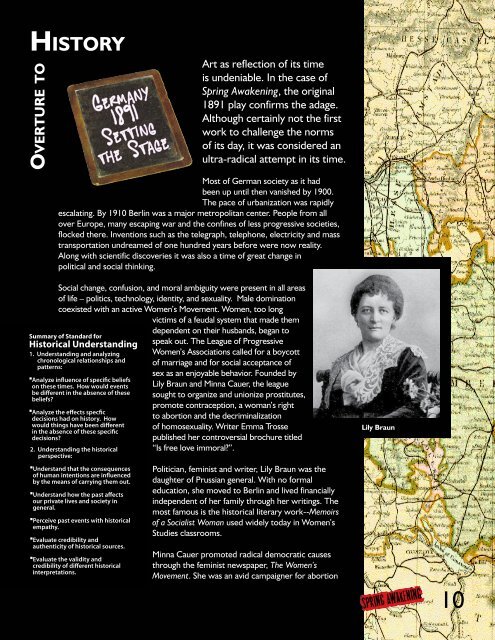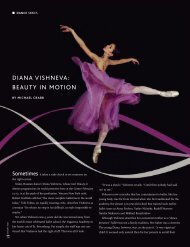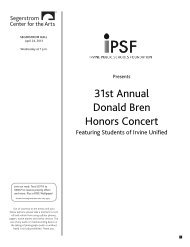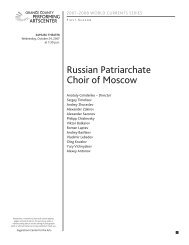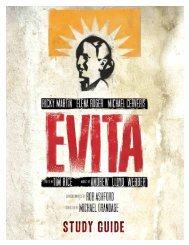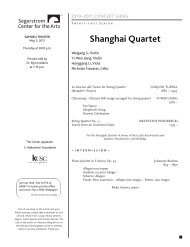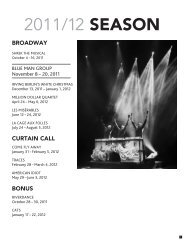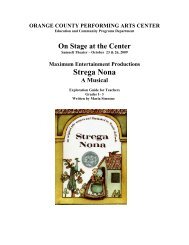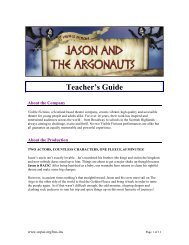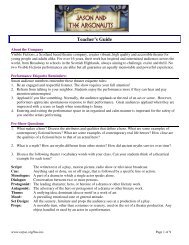SPRING AWAKENING - Segerstrom Center for the Arts
SPRING AWAKENING - Segerstrom Center for the Arts
SPRING AWAKENING - Segerstrom Center for the Arts
Create successful ePaper yourself
Turn your PDF publications into a flip-book with our unique Google optimized e-Paper software.
History<br />
Overture to<br />
Summary of Standard <strong>for</strong><br />
Historical Understanding<br />
1. Understanding and analyzing<br />
chronological relationships and<br />
patterns:<br />
•<br />
Analyze influence of specific beliefs<br />
on <strong>the</strong>se times. How would events<br />
be different in <strong>the</strong> absence of <strong>the</strong>se<br />
beliefs?<br />
•<br />
Analyze <strong>the</strong> effects specfic<br />
decisions had on history. How<br />
would things have been different<br />
in <strong>the</strong> absence of <strong>the</strong>se specific<br />
decisions?<br />
2. Understanding <strong>the</strong> historical<br />
perspective:<br />
•<br />
Understand that <strong>the</strong> consequences<br />
of human intentions are influenced<br />
by <strong>the</strong> means of carrying <strong>the</strong>m out.<br />
•<br />
Understand how <strong>the</strong> past affects<br />
our private lives and society in<br />
general.<br />
•<br />
Perceive past events with historical<br />
empathy.<br />
•<br />
Evaluate credibility and<br />
au<strong>the</strong>nticity of historical sources.<br />
•<br />
Evaluate <strong>the</strong> validity and<br />
credibility of different historical<br />
interpretations.<br />
G e r m a n y<br />
1891<br />
S e t t i n g<br />
t h e Stage<br />
Art as reflection of its time<br />
is undeniable. In <strong>the</strong> case of<br />
Spring Awakening, <strong>the</strong> original<br />
1891 play confirms <strong>the</strong> adage.<br />
Although certainly not <strong>the</strong> first<br />
work to challenge <strong>the</strong> norms<br />
of its day, it was considered an<br />
ultra-radical attempt in its time.<br />
Most of German society as it had<br />
been up until <strong>the</strong>n vanished by 1900.<br />
The pace of urbanization was rapidly<br />
escalating. By 1910 Berlin was a major metropolitan center. People from all<br />
over Europe, many escaping war and <strong>the</strong> confines of less progressive societies,<br />
flocked <strong>the</strong>re. Inventions such as <strong>the</strong> telegraph, telephone, electricity and mass<br />
transportation undreamed of one hundred years be<strong>for</strong>e were now reality.<br />
Along with scientific discoveries it was also a time of great change in<br />
political and social thinking.<br />
Social change, confusion, and moral ambiguity were present in all areas<br />
of life – politics, technology, identity, and sexuality. Male domination<br />
coexisted with an active Women’s Movement. Women, too long<br />
victims of a feudal system that made <strong>the</strong>m<br />
dependent on <strong>the</strong>ir husbands, began to<br />
speak out. The League of Progressive<br />
Women’s Associations called <strong>for</strong> a boycott<br />
of marriage and <strong>for</strong> social acceptance of<br />
sex as an enjoyable behavior. Founded by<br />
Lily Braun and Minna Cauer, <strong>the</strong> league<br />
sought to organize and unionize prostitutes,<br />
promote contraception, a woman’s right<br />
to abortion and <strong>the</strong> decriminalization<br />
of homosexuality. Writer Emma Trosse<br />
published her controversial brochure titled<br />
“Is free love immoral?”.<br />
Politician, feminist and writer, Lily Braun was <strong>the</strong><br />
daughter of Prussian general. With no <strong>for</strong>mal<br />
education, she moved to Berlin and lived financially<br />
independent of her family through her writings. The<br />
most famous is <strong>the</strong> historical literary work--Memoirs<br />
of a Socialist Woman used widely today in Women’s<br />
Studies classrooms.<br />
Minna Cauer promoted radical democratic causes<br />
through <strong>the</strong> feminist newspaper, The Women’s<br />
Movement. She was an avid campaigner <strong>for</strong> abortion<br />
Lily Braun<br />
10


